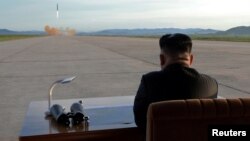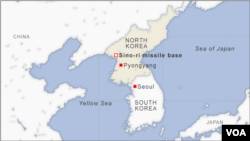A report released on Monday by the Center for Strategic and International Studies (CSIS) about a previously undisclosed North Korean missile site may have caught some casual North Korean observers by surprise. But Nam Sung-wook, professor at Korea Unification, Diplomacy and Security at Korea University, said the Sino-ri facility was previously known to both the United States and South Korean intelligence services.
“Last year the U.S. made a report about Sakkanmol and Sino-ri this January. Those are not fresh discoveries,” he said.
Archived South Korean news reports dating back to 1998 acknowledge the Sino-ri site as a facility for Nodong missiles.
The CSIS report declared that one of 20 undeclared ballistic missile bases in North Korea serves as a missile headquarters facility and the “Sino-ri missile operating base and the Nodong missiles deployed at this location fit into North Korea's presumed nuclear military strategy by providing an operational-level nuclear or conventional first strike capability.”
Kim Dong-yub, the head of the Office of Research at the Institute for Far East Studies (IFES) at Kyungnam University, added, “Although the North has not declared the site officially, it does not mean that it is new. No countries openly announce all the military bases.”
Nam notes that the United States focuses on small details regarding denuclearization, like the dismantling of intercontinental ballistic missiles (ICBMs) to reduce the threat to the to the U.S. “For [President] Trump, he can use this to boast about his achievement during the second summit,” Nam said.
Implications for upcoming North Korean Summits
The CSIS report came days after the White House announced that U.S. President Donald Trump would meet North Korean leader Kim Jong Un in late February and that he "looks forward" to the denuclearization talks.
In its report, CSIS said the Sino-ri base was not previously declared by Pyongyang and "does not appear to be the subject of denuclearization negotiations."
Speaking to Reuters news agency, one of the report’s authors, Victor Cha, said “The North Koreans are not going to negotiate over things they don't disclose. It looks like they're playing a game.”
Nam assesses Trump’s focus on the talks with Kim is about eliminating threats, like ICBMs.
“It is hard to achieve complete denuclearization, so including dismantling ready-made weapons from the past, which arouse the strong opposition remains the focus on the present and the future talks. These include ICBMs and missile test sites,” said Nam.
He added that Seoul does not regard the Sino-ri facility as one that imposes a direct threat to South Korea, citing the September 19 Pyongyang Declaration and its efforts to de-escalate tension on the peninsula.
Kim Dong-yub said the CSIS report focuses too much on a connection between the missile facilities and denuclearization.
“The North already announced denuclearization and they took some steps, although some require verification,” said Kim, “So it is not proper to judge their willingness by their possessions of military bases.”
Kim said some groups opposing talks with North Korea and may try to leverage the news to press Pyongyang for more concessions, but he says the upcoming talks between the United States and North Korea should not include these types of missile facilities, for if they do, they could detract from progress on denuclearization.
In an email to VOA, Bruce Klinger, senior research fellow for Northeast Asia at the Heritage Foundation, wrote, “During a second summit, Trump must insist on tangible steps toward North Korean denuclearization, including a data declaration of the regime’s nuclear and missile programs. Trump shouldn’t offer more concessions nor agree to reduce U.N. and U.S. sanctions until Kim moves beyond the symbolic gestures it has taken so far.”
The White House has not commented on the CSIS report and neither Washington nor Pyongyang has yet to officially announce the date or location of the second U.S. - North Korean summit, although some speculate it may take place in Vietnam.
In addition, local media reports in South Korea have indicated the Moon administration may attempt to host Kim in Seoul during the 100th anniversary of the March 1 independence movement.






